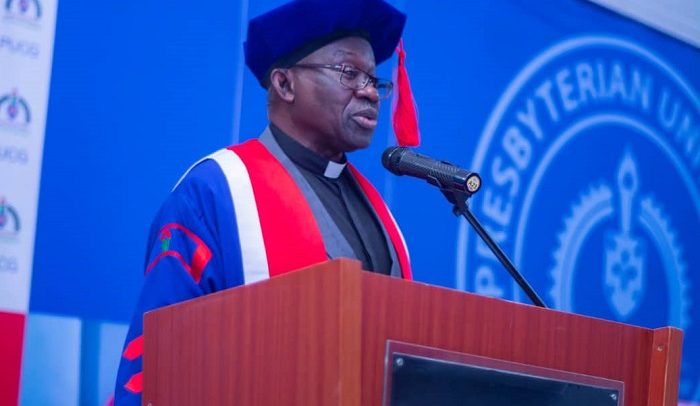Prof. Emmanuel Addow Obeng, PUCG President
THE PRESBYTERIAN University College Ghana (PUCG) has instituted various pragmatic measures to reduce financial burden on students who wish to pursue tertiary education, beginning from the 2020/2021 academic year.
As part of the measures, tuition fees for the programmes at the university college have been set at competitively moderate levels to enable less-privileged students pay their fees without stress.
Management of the PUCG said its move is geared toward augmenting government’s effort at making higher education accessible and affordable for the Ghanaian people.
The average tuition fee for a diploma programme is GH₵2,400 for an academic year; an undergraduate programme costs GH₵3,000 for an academic year; while a graduate programme costs an average of GH₵6,500 for the entire programme.
In a correspondence, the university’s management said it has put in place an installment fees payment plan of four payables within an academic year to help students with financial challenges pay their fees.
With the policy, PUCG said students are required to pay 60 per cent of the fees at the beginning of the semester to register and pay the remaining 40 per cent before the end of the semester.
But the university college grants students with peculiar financial problems, special dispensation regarding the payment of their fees.
PUCG also offers partial scholarship of up to 10 per cent on tuition fees to all students offering undergraduate and diploma programmes in the institution.
“The students enjoy this scholarship facility throughout the period of their study. It has also facilitated an Absa (Barclays) Bank scholarship which gives selected students full scholarship,” it stated in the correspondence.
Currently, the university is also implementing a policy of non-sale of academic materials generated by lecturers to students, with relevant books stocked in its various campus libraries across the country.
Other academic materials are made available on the university’s e-learning platform for free; this is to lessen the burden on students having to spend extra money on books.
Officials indicated that cost of students’ accommodation which includes all utility bills at the university college’s various campuses have also been priced moderately.
There is a transport system that provides free shuttle services for students in their movement between hostel and campus on daily basis.
The PUCG, which was established by the Presbyterian Church of Ghana (PCG) in 2003, currently runs 17 undergraduate programmes, three HND/diploma programmes and five graduate programmes across its five campuses in the country.
These programmes are designed to strategically sharpen its students’ employable skills and knowledge to meet the demands of the contemporary global job market.
Undergraduate programmes being run under six faculties include Health and Medical Sciences, Science and Technology, Development Studies, Education, Law, and School of Business and Economics.
The School of Graduate Studies offers five programmes including MSc. Natural Resources Management, Environmental Health and Sanitation, Financial Risk Management, M.A. International Development, and M.Ed. Educational Studies.
The diploma programmes are Higher National Diploma in Information Communication and Technology, and Diploma in Business Administration, Public Administration and Public Relations.
The PUCG’s Centre for Professional Studies (CPS) oversees the organisation of short certificate courses tailored for various professions. It is aimed to offer opportunity for upgrade of knowledge, skills and resilience to improve efficiency and effectiveness at the workplace and the society at large.
The CPS currently runs Certificate in Occupational Health, Safety & Environmental Management, Certificate in Public Service Leadership & Governance, Certificate in Financial Risk Management, Certificate in Labour Law & Human Resource Policy, Certificate in Church Leadership & Administration, Guidance and Counseling, and Emotional Intelligence.
The university college has over the years carved a niche for a comprehensive academic work that ensures students experience quality teaching and learning. This has been achieved through a number of measures.
For students to be abreast of the world’s modern trends in their field of study, the university has set up modern computer laboratories in all the five campuses with high speed internet connectivity to support faculty and students learning and research.
In addition, every student is given a modem to connect them to the Internet while out of campus to assist in their continuous study, thereby making learning less stressful.
Moreover, every campus has a well-furnished and stocked library for students and faculty research which are complemented by an electronic library and an e-learning platform where students interact with their lecturers and source relevant electronic books and materials for their study.


